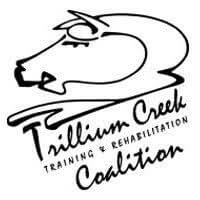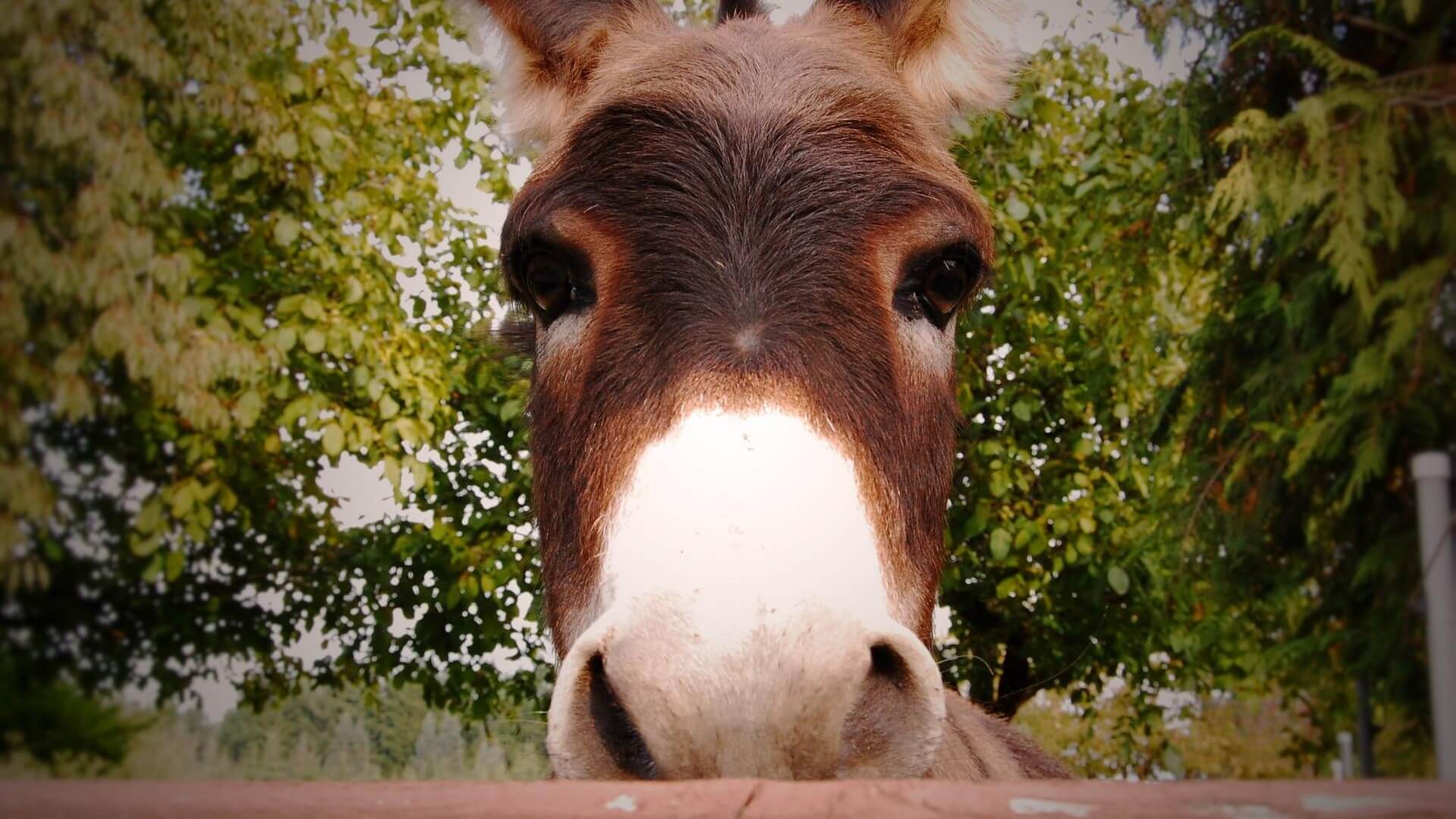Diary Describes a Donkey Dilemma…
“When a donkey says NO, there isn’t much you can do. We TRIED AGAIN!”
“There is a wonderful book about donkeys called Running with Sherman. The Donkey With the Heart of a Hero, by Christopher McDougall. It is an entertaining book that will help people understand donkeys. My main takeaway is that donkeys are smart and have minds of their own. You cannot tell a donkey what to do. You have to let them think an action is their idea,” Laura Hill wrote in her diary after a particularly frustrating morning trying to get her little Nazarene donkey, “Hank”, to step into a trailer. He’d been in trailers many times. But this time it was laden with emotion. He was to leave the only home he’d ever known…her’s…where he’d arrived in her arms 14 years ago as a 40-pound baby from the auction yard. He had thrived there, in charge of the green pastures, protecting an elderly Hackney pony. Hank lost his charge when the pony passed away last summer, so he was destined today for his forever home… TCTC … as unforeseen life changes for Laura and her husband, Todd Miller, forced a downsize from their beloved Miller Hill Farm to a more manageable home.
“Today we failed our agenda,” she wrote. “Bonnie and Clara arrived with their horse trailer that had a stall for a mini. Hank was not interested in loading into a strange trailer. We loaded up one of his pasture mates into the other side. That didn’t work. When a donkey says NO there is not much you can do.”
Hank just wasn’t ready. He knew they weren’t, so he wouldn’t budge.
“Selling our farm is so difficult in so many ways! Everything is emotional. Hank’s happiness is our first priority. I’m convinced he’ll love living at TCTC, though losing him breaks our hearts. God, this is so hard! We are grateful for TCTC helping us through this grieving process…
“We will try again tomorrow. He will get his breakfast in our horse trailer. In and out, daily. We will try to desensitize him kindly. It may take a week. Eventually Hank will load up and move to TCTC. Good things are worth waiting for, for us humans. Slow, kind, training is what Hank needs and deserves. He is going to experience a huge life change. I believe he will be very happy. His transition will be a big adjustment for him. I know everyone at TCTC will be kind and patient with him. Cross your fingers and send love to Hank for his move. The story continues…”
Hank keeps track of Todd while he captures this image of Laura, Hank and their home.
So Hank Seabiscuit is ready for a new job.
“Hank has lived his entire life on our farm. He is very curious and affectionate and likes to be in on the activities around the farm. He gets along with all other horses but beware, he does not like dogs or coyotes. Donkeys are often used as guard animals to protect sheep or goat herds from them. He puts his head down and charges. So best not to let dogs into his pasture. He is short and plump but he is strong and fast. If I am late with his breakfast he will let me know with an occasional bray,” Laura wrote.
A Nazarene Donkey, also known as a Nubian, Jerusalem or Bethlehem donkey, Hank has a dark stripe down his back and over his shoulders forming a cross. Christian doctrine depicts a Nazarene donkey carrying Mary to Bethlehem for the birth of Jesus, and another who wanted to carry the heavy cross for Jesus. There are many stories crediting donkeys for carrying burdens of people who care for them.
“Hank has always taken burdens off my shoulders by making me happy just being around him. He is a big giggle maker! We think he will like his new job as a companion to all at TCTC and he will enjoy lots of attention. We will be visiting him often,” Laura added.
Donkeys first arrived in North America with Columbus and the rest of the Spanish and Portuguese conquistadors. They quickly “burro’d” their way into hearts and minds of early settlers as useful pack animals, and continue charming today’s owners.
Donkeys keep their feelings hidden. They’re not as naturally affectionate as other animals. But they’re brilliant. They understand our movements and emotions. Slight movement of their eyes can indicate stress or fear yet their low flight response makes them appear confident. They stand their ground to face fearful things that would cause a horse to bolt.
Donkeys use their bray, movements and poses to communicate with you, and can be heard from great distances. Hank learned quickly that I was TCTC’S “lead mare”. As soon as he heard my voice talking to Walt or Daisy coming out of our house across the entire property, or the sound of my tricycle coming up the driveway, he let me know he was accepting visitors! If you’ve never heard a donkey bray up close and personal, you just HAVE TO! The bray of each donkey is UNIQUE. Like a lion’s roar, its vacuous launch comes from deep inside the soul, suddenly EMBRACING you from all sides with the power of a bullhorn transcending into sweet longing as its lingering tones reach your ears, imploring you … “come be with me…”
When I asked Amy Fellows, who volunteered help to keep Hank’s waistline IN LINE by taking and logging weekly tape-measuring, what she felt his most endearing quality was she said:
“Awwww. I am still getting the hang of measurements so I’m glad you didn’t ask me about his weight! He likes to lay his head over my shoulder, lean in and give me a HUG, and I LOVE hearing him bray. It is adorable!”
Donkeys understand your movements and emotions. Though they are highly affectionate animals they rarely take time to show affection. They do not trust easily. Building relationship and affection takes respect and time, little steps and commitment to assure them that they’re safe and you offer no threat. Though it’s hard to resist touching their ears, the areas around their eyes and ears are sensitive and should be avoided. Better to rub the neck, chest and shoulders to become friends and gain trust. Hank likes fairly strong circular massages from my fingertips down his spine and light downward neck strokes.
Signs that donkeys trust you:
1) They make physical contact with you. It means you’re important to them, and they trust you.
2) They stay close. When they stay near you or go with you wherever you go, you gain one step toward their affection.
3) They mimic you. They’ll step forward if you do, or back if you do. They may repeat your movements with your head or body if they’ve been trained by you.
Simply loving a donkey will not help you or your donkey really bond. Do not stress the donkey. Give all the time, space and care required. Donkeys only show affection if they feel safe, which depends on many environmental factors. Donkeys are smart and will tell you if something is wrong. They may reject your initial acts of compassion, but will become closer to you with time. To influence them you need to be confident and experienced enough to find the right approach.
Training is a great way to get closer to a donkey, as it provides discipline and bonding. Develop a personalized training system that builds confidence. Time together will strengthen trust. Rewards of praise are the best motivation. Be a friend. When a donkey feels that you hear and understand him, your relationship goes to another level.
When asked what caused his jubilant enthusiasm after discovering a donkey in the Orchard Pasture while feeding the morning after Hank’s TCTC arrival,
Tom Mueller, TCTC Board Treasurer, said: “Simple. I have always loved donkeys!”
Young TCTCer, Olive Coleman, who’s family sponsors Poniferous, contributes a significant amount of time and boundless energy volunteering at TCTC and is responsible for filling Hank’s weekly vitamin supplement bins. She states: “He’s VERY strong willed! He’s a little guy with a HUGE personality!”
I’ve loved donkeys since I was 8 years old and kissed every one I could get close enough to as my family explored post WWII European countryside. It never ceased to amaze me how the loads donkeys appeared to so easily carry were many times their size, especially in Crete, Greece, where they had haystack-sized bundles of branches collected for firewood roped to their back as they walked uphill on cliffside roads clinging to the island. Heads and ears barely emerged from those bundles, which towered over their diminutive bodies. Nearly 15 years later as a professional journalist covering an international agricultural congress in East Berlin, Germany, I photographed an elderly lady who had knitted an entire wool body suit for her donkey, leggings, “ear-lings”, neck to rump. She clearly loved her donkey and had done all she could to keep him warm while she sold goods from heavy wood cabinets strapped to his back for literally pennies, then frigidly huddled close to him between random, sparse sales to customers on a cobblestoned market street.
As I researched donkey best care practices, I found photos of modern donkeys employed around the world to carry burdens (pictured below) as I’d remembered. Many of these donkeys have since been saved by a lifetime home sanctuary similar to TCTC run by two women from the U.K.
Walt caught Hank “warming up” to Clara, TCTC Barn Manager, after she knelt down on mini donkey level to receive a hug…and got a “bit” more than she bargained for…a little love nibble with some teeth behind it! When working with donkeys, quality time helps you develop fundamental skills in safety, patience, respect for independence (you have to learn about how they think to learn to respect their way of thinking!); flexibility and perseverance (to develop workarounds), and shared enjoyment keeping on your toes (to avoid being outsmarted)! To “read” donkeys, you must pick up on subtle physical cues like EAR POSITION; swishing tails, balking (when they freeze not from stubbornness, but from CAUTION). An intelligent, long-lived donkey keeps you engaged, brings enjoyable challenges as you develop and maintain your relationship in a lifelong pursuit. If well cared for Hank could live to be over 40, so we have plenty of time!
Clara says: “Hank has a big persona in a small package…A fiercely loyal companion. Quite a singer as it turns out, and he’s a REAL FLUFF BALL!”
So, Hank Seabiscuit…you’re on!
Bring TCTC giggles galore for the next quarter century!

Trillium Creek Training and Rehabilitation Coalition is a 503(c)3 nonprofit with 10 acres of woods, trails, water, gardens, orchards, and 12 horses who have been healed and retrained to safely offer relationships with humans who are learning to be resourceful, self-reliant, community-oriented, and dedicated to sustainable practices that enhance the quality of their lives, the land, and the planet.

